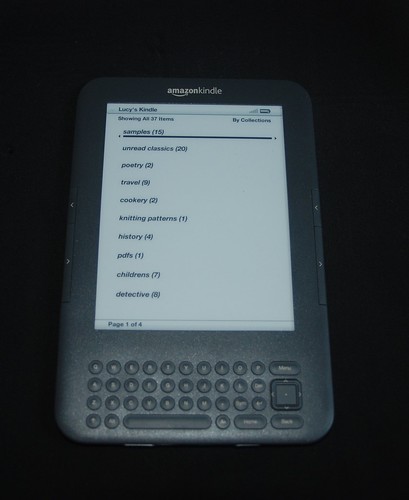When I was a child, the idea of a portable device that would hold thousands of books was science fiction. I recently bought one. Here it is.
There are several advantages to e-readers. The device is light in weight and small in size; smaller than an average paperback. The screen is easy to read, and the font size can be changed to allow for differing eyesight and lighting conditions. I can now carry enough books to be able to read through the entirety of a long flight – a thousand times over. I can read pdfs on the Kindle too, which means that I can now carry large chunks of my academic library with me. The device will even read some books out in a Stephen Hawking voice. The voice can be male (Stephen Hawking) or female (female version thereof) and the speed adjusted (very fast Stephen Hawking). Although the words are clear, the effect is slightly odd, as intonation is lacking. I don’t think I will be using this feature much, unless I buy A Brief History of Time, in which case it would be perfect.
Books are available almost instantly via the internet. This is certainly an advantage – no more waiting till I get to a bookshop/library before getting the next book in a series. This could also be a problem – I find I have to limit my visits to Amazon, although I usually manage to restrict myself to the free e-books.
There are some disadvantages to e-readers, too. I find they're not so good for things other than plain text. The screen only displays shades of grey, and some images just don't look right unless they're in colour. Also, flipping between an image and its caption is a nuisance, and even more so if you want to check something three pages back - for some things paper is definitely better! This isn’t a problem for most fiction, but for academic use it is often easier to print something out than to try to read it on-screen.
The most serious disadvantage of the Kindle is that it is an electronic device, which means that it has a finite (and not very long) life. Many of my paper books will be passed on to succeeding generations, but I am certain that my Kindle will not be. Even if it doesn’t suffer an accident that a paper book would have survived (for example, being dropped onto a hard surface), these things just die after a while. I can of course buy a new one and continue to read all the same books, as Amazon keeps a list of the ones I have downloaded. This will probably work out quite well, as I will have saved enough on not buying paper books (usually more expensive than the electronic version) to be able to afford another e-reader. However, it does mean that I have to keep spending money in order to keep reading items that I already own.
All in all, for my situation, in which books (at least ones that I can read) are expensive and the selection is limited, it's perfect. I will be using it mostly for fiction books, and not for academic texts. I certainly won’t be giving up buying paper books, but for light entertainment, where I am not too concerned about keeping a permanent copy, the Kindle will do nicely.
Lucy
Friday, 23 September 2011
My kindle
Subscribe to:
Post Comments (Atom)


No comments:
Post a Comment